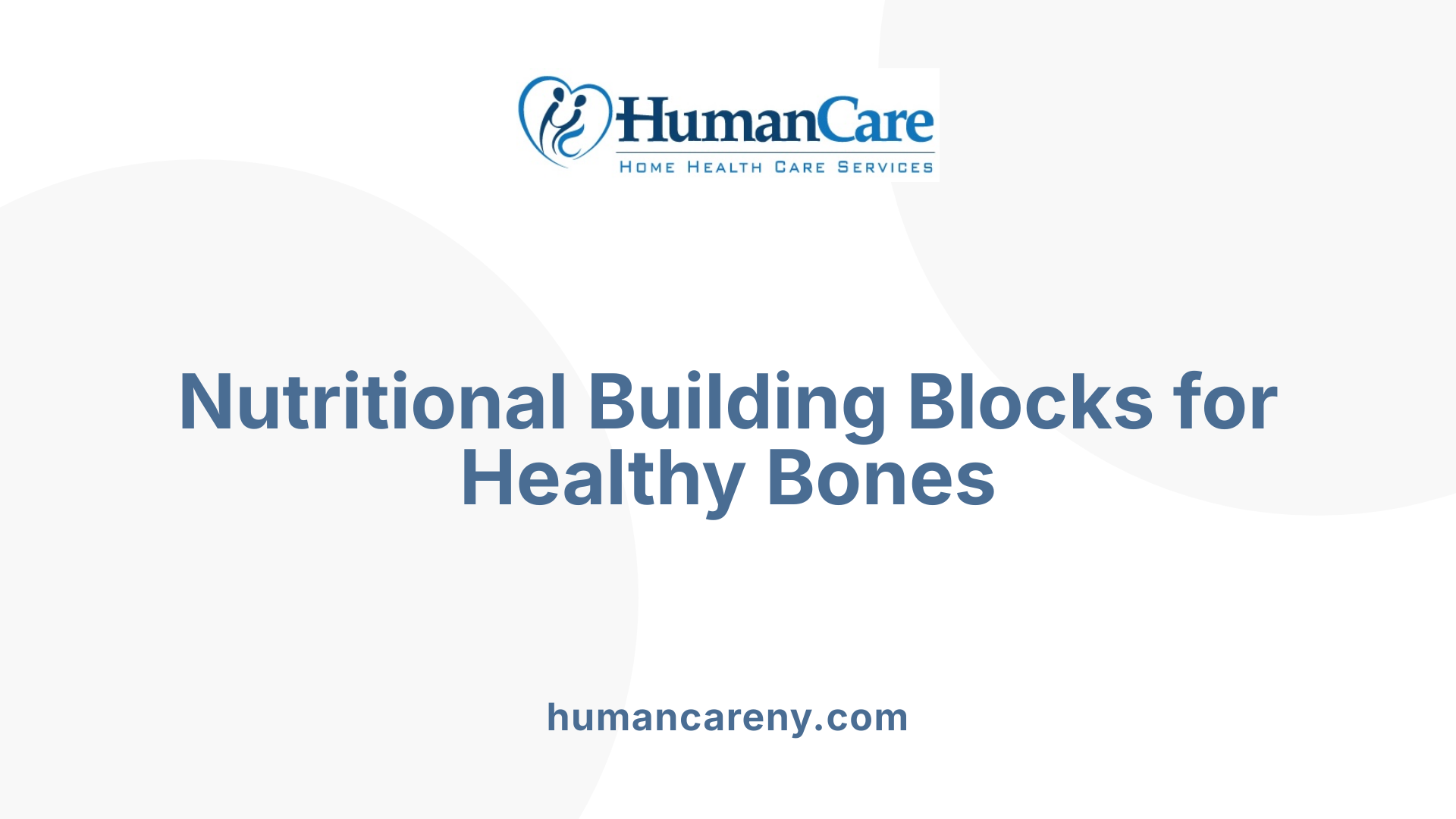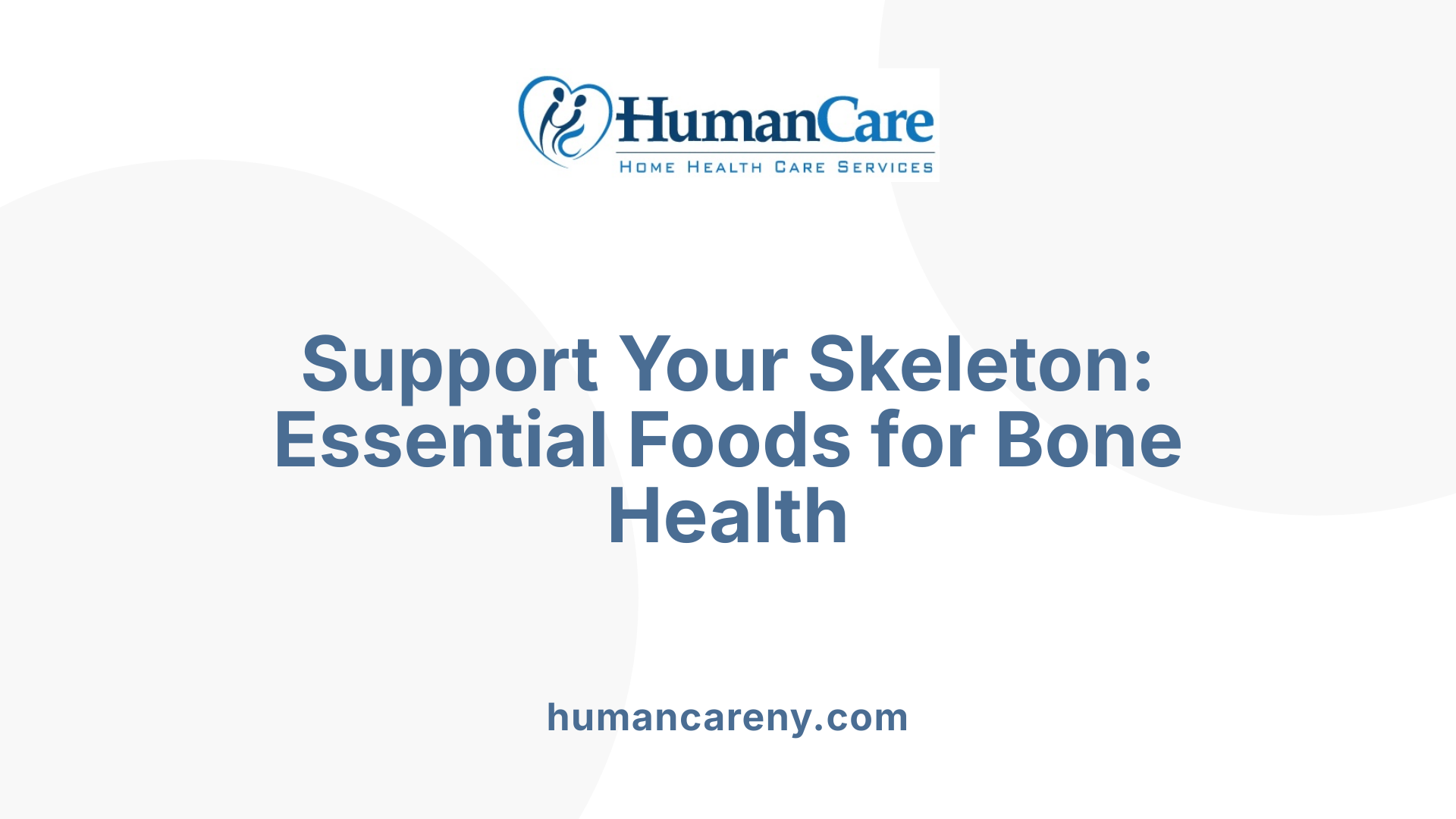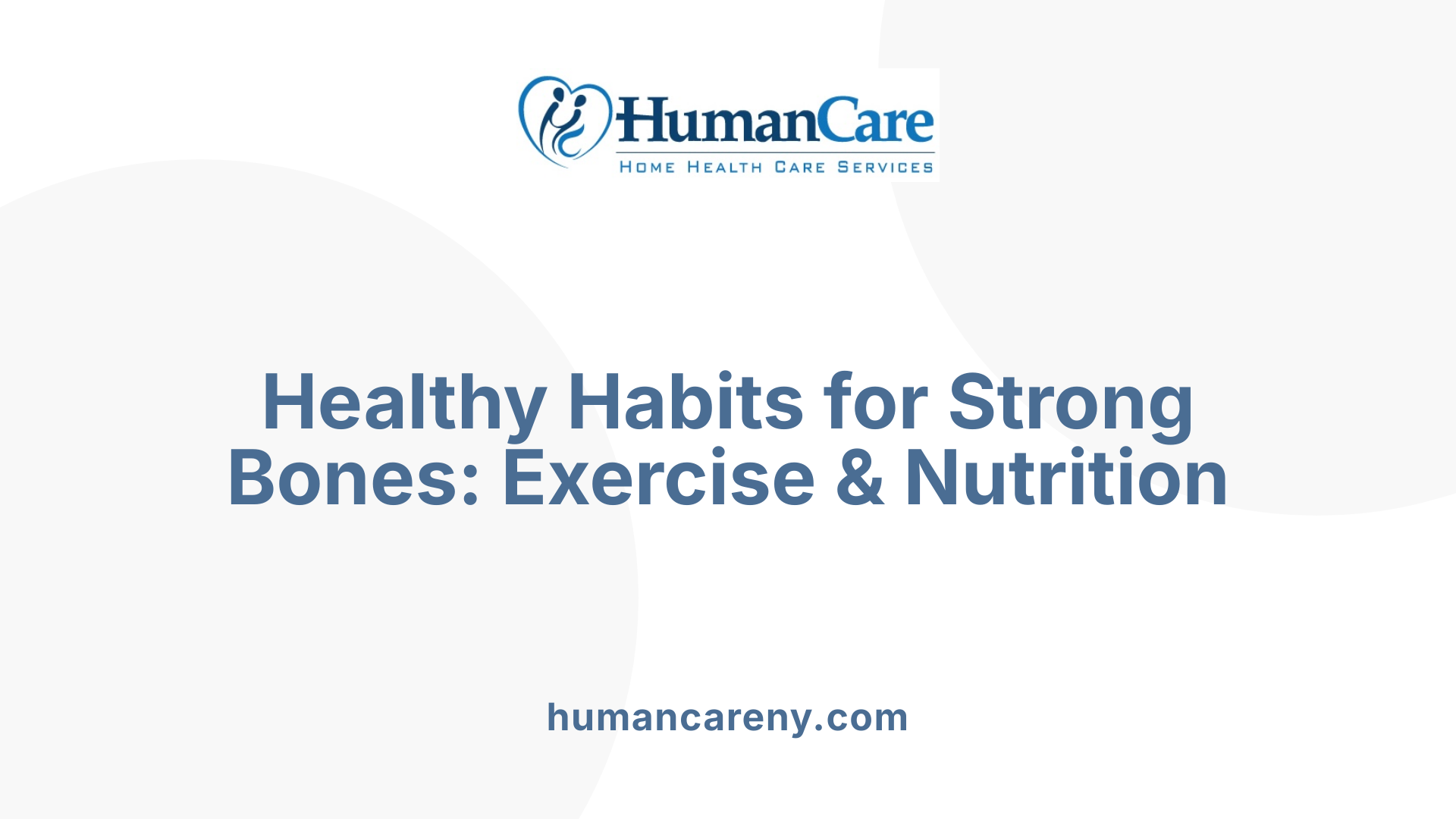Understanding the Foundations of Bone Health
Bone health is vital at every stage of life, influencing mobility, activity, and overall well-being. An optimal diet packed with specific nutrients such as calcium, vitamin D, magnesium, vitamin K, and protein plays a pivotal role in maintaining and enhancing bone strength. Alongside dietary choices, lifestyle habits like weight-bearing exercise, sun exposure, and avoiding harmful substances contribute significantly to preventing conditions like osteoporosis. This article explores the key foods and nutrients that support bone density, dietary recommendations to prevent bone loss, and practical strategies to foster healthy, resilient bones.
Nutritional Cornerstones of Bone Strength

What foods and nutrients support bone density and overall bone health?
A diet that promotes strong bones typically includes nutrients like calcium, vitamin D, magnesium, phosphorus, vitamin K, and protein. These nutrients work together to build, maintain, and repair bone tissue.
Calcium is the primary mineral in bones and can be found in dairy products such as milk, cheese, and yogurt, as well as in leafy greens like kale and turnip greens. Fortified plant-based drinks, nuts, beans, and fish with edible bones, such as sardines and salmon, are also excellent sources.
Vitamin D is vital for calcium absorption and bone mineralization. Main sources include sunlight exposure, oily fish like salmon and mackerel, egg yolks, and fortified foods like certain cereals and orange juice.
Magnesium, found in nuts, whole grains, and dark leafy greens, supports bone structure, while phosphorus, present in beans and fish, helps form the mineral matrix of bones.
Vitamin K, especially K2, plays a role in activating proteins involved in bone mineralization. Rich sources include leafy greens such as kale, spinach, and collard greens.
Together, these nutrients contribute to maintaining bone density and strength. Lifestyle habits like weight-bearing exercise, limiting alcohol consumption, avoiding smoking, and ensuring a balanced diet are also crucial for optimal bone health throughout life.
What are the best dietary recommendations and food sources beneficial for preventing or managing osteoporosis?
To combat or prevent osteoporosis, focus on a diet rich in calcium, vitamin D, magnesium, vitamin K, vitamin C, and omega-3 fatty acids.
Core foods include dairy products, leafy greens such as broccoli and kale, fatty fish like salmon and mackerel, nuts, seeds, and fortified foods. For vegetarians or vegans, calcium-enriched plant milks, tofu, beans, and fortified cereals are vital.
Limiting foods high in sodium, caffeine, alcohol, and processed sugars helps prevent calcium loss and bone deterioration.
A combination of good nutrition, regular weight-bearing activities, and adequate sunlight exposure enhances bone density and reduces fracture risk.
What nutrients are key for maintaining or improving bone strength?
Maintaining or improving bone strength hinges on adequate intake of calcium, vitamin D, magnesium, vitamin K, and phosphorus.
Calcium is foundational for bone formation, while vitamin D enhances calcium absorption. Magnesium influences bone mineral density, and vitamin K supports the activation of proteins needed for mineralization.
Including foods like dairy, green vegetables, nuts, whole grains, and fish can provide these essential nutrients.
Supplements may be considered if dietary intake is insufficient, but it is advisable to consult healthcare providers.
How does diet influence bone health and the prevention of osteoporosis?
Diet directly impacts bone health by supplying the necessary nutrients to build and maintain dense, healthy bones. Proper nutrition helps offset age-related decline, hormonal changes, and lifestyle factors that stress the skeletal system.
A nutrient-rich diet supports early bone development during childhood and adolescence, maintains bone mass in adulthood, and slows bone loss in older age.
Preventing osteoporosis involves a holistic approach: adequate nutrient intake, physical activity, healthy lifestyle choices, and monitoring bone density when necessary.
How can I naturally support and enhance my bone density through lifestyle and dietary strategies?
Enhance your bone density by adopting a diet high in calcium, vitamin D, and other supportive nutrients such as magnesium and vitamin K.
Engage in weight-bearing and resistance exercises like walking, stairs, or strength training at least 3-4 times a week.
Ensure sufficient sun exposure to boost vitamin D levels and consider supplements if needed.
Maintain a healthy weight, avoid smoking, limit alcohol consumption, and incorporate balance exercises to reduce fall risk.
Incorporating these habits, along with regular medical checkups, can help sustain or increase bone density naturally.
Foods That Support Bone Density and Their Benefits

What foods are beneficial for maintaining strong bones and joints?
Maintaining healthy bones and joints depends heavily on a diet rich in specific nutrients. Foods high in calcium, vitamin D, magnesium, and vitamin K play a vital role. Good sources of calcium include dairy products like milk, cheese, and yogurt; dark leafy greens such as kale, collard greens, and bok choy; fortified plant-based drinks; tofu; nuts; and canned fish like sardines and salmon with bones. Vitamin D is mainly obtained from oily fish like salmon, mackerel, and sardines, as well as from egg yolks, fortified foods, and sunlight exposure. This vitamin is essential because it helps the body absorb calcium effectively. Magnesium, crucial for maintaining bone structure, is found in nuts, seeds, whole grains, and greens. Incorporating a variety of these foods, along with regular sun exposure and physical activity, fosters optimal bone and joint health.
What foods help build and repair bones fast?
For rapid bone building and repair, focusing on foods rich in calcium, phosphorus, vitamin D, protein, and vitamin C is beneficial. Calcium supplies the main mineral component of bones; sources include dairy products, leafy greens, fortified plant-based drinks, and canned fish with bones like sardines. Phosphorus, which supports bone structure, is present in animal proteins, dairy, nuts, beans, and whole grains. Vitamin D enhances calcium absorption, available from fatty fish, fortified foods, and sun exposure. Protein is indispensable for tissue repair—good sources are eggs, lean meats, and fish. Vitamin C from various fruits and vegetables contributes to collagen synthesis, aiding in the quick healing of bones.
What foods increase bone density?
To boost bone density, emphasize calcium-rich foods such as milk, cheese, yogurt, and fortified plant-based milks. Green leafy vegetables, notably kale, collards, and turnip greens, contain calcium and vitamin K, which help strengthen bones. Canned fish with edible bones, like sardines and salmon, supply calcium and vitamin D, promoting calcium absorption. Sunlight exposure and foods like fatty fish also contribute to adequate vitamin D levels. Incorporate magnesium, zinc, and omega-3 fatty acids found in nuts, seeds, figs, and fatty fish—all of which support bone health and density.
| Food Source | Nutrients Provided | Additional Benefits |
|---|---|---|
| Dairy products | Calcium, Vitamin D | Strengthen bones, improve calcium absorption |
| Dark leafy greens | Calcium, Vitamin K, Magnesium | Support bone mineralization, prevent bone loss |
| Canned salmon and sardines | Calcium, Vitamin D, Protein | Promote bone strength, provide high-quality protein |
| Fortified plant milks | Calcium, Vitamin D | Alternative to dairy, support bone density |
| Nuts and seeds | Magnesium, Calcium, Zinc | Enhance bone matrix, support mineralization |
| Figs | Calcium, Potassium, Magnesium | Boost mineral content for bone strength |
| Fatty fish | Vitamin D, Omega-3 fatty acids | Reduce inflammation, promote healthy bone formation |
Understanding and consuming a diverse array of these foods, combined with vigilant lifestyle choices like regular weight-bearing exercises and avoiding smoking and excess alcohol, can significantly contribute to stronger bones and reduced osteoporosis risk.
The Role of Lifestyle in Maintaining Bone Density

Which foods help build and repair bones fast?
Foods that support rapid bone repair and growth are rich in essential nutrients like calcium, phosphorus, vitamin D, protein, and vitamin C. Calcium is fundamental for bone strength and can be found in dairy products such as milk, cheese, and yogurt, as well as in green leafy vegetables (excluding spinach because of oxalates), fortified plant-based drinks, and canned fish with bones like sardines and pilchards. Phosphorus, vital for maintaining bone structure, is present in animal proteins, dairy, nuts, beans, and whole grains.
Vitamin D enhances calcium absorption and is obtained from fatty fish such as salmon, mackerel, and sardines, in addition to fortified foods and sunlight exposure. A high-quality protein intake from sources like eggs, lean meats, and fish supports tissue repair, facilitating faster healing of bones. Vitamin C, crucial for collagen synthesis, comes from fruits and vegetables such as oranges, strawberries, and bell peppers, promoting the formation of new bone tissue.
Ensuring adequate nutrition from these sources can speed up bone building and repair processes, especially after fractures or injuries.
What are some effective natural ways to strengthen bones and joints?
Strengthening bones and joints naturally involves a combination of dietary choices and physical activity. Engaging in weight-bearing and high-impact exercises like brisk walking, jogging, dancing, and sports such as tennis or soccer stimulates bone formation and increases bone density.
A diet rich in calcium is equally important; good sources include dairy products, leafy greens (like kale and collard greens), canned sardines and salmon with bones, and fortified plant-based drinks. Adequate vitamin D levels, obtained through sunlight exposure and dietary sources like oily fish and fortified foods, help the body absorb calcium effectively.
Incorporating foods that supply magnesium, zinc, and omega-3 fatty acids, such as nuts, seeds, fatty fish, and whole grains, can reduce inflammation and support overall bone health. Lifestyle habits like avoiding smoking and limiting alcohol consumption help prevent bone deterioration.
Maintaining a healthy weight reduces undue stress on joints and bones, preserving their strength over time. In addition, moderate exercise routines tailored to one's fitness level can improve joint flexibility and strength.
Regular bone density testing, especially for at-risk populations, allows early detection of bone loss, enabling timely intervention. When necessary, healthcare providers can recommend supplements or medications to support optimal bone health, combining natural and medical approaches for best results.
Supporting Bone Health Throughout Life
Maintaining healthy bones is a lifelong endeavor that involves a combination of nutritious eating, regular physical activity, and healthy lifestyle choices. Including a variety of calcium-rich foods such as dairy, leafy greens, fortified foods, and fish with bones ensures your bones get the minerals they need for strength. Supporting nutrients like vitamin D, magnesium, vitamin K, and omega-3 fatty acids further enhance bone resilience. Lifestyle habits such as engaging in weight-bearing exercise, avoiding smoking, limiting alcohol and caffeine, and getting sufficient sunlight exposure are equally vital. Periodic bone density tests can help track progress and guide interventions. By adopting these dietary and lifestyle strategies, you can build a robust foundation for healthy bones, reduce the risk of osteoporosis, and enjoy mobility and strength well into old age.
References
- Food for healthy bones - NHS
- Osteoporosis Super-Foods for Strong Bones - WebMD
- Surprising foods that boost bone health - Harvard Health
- Bone health: Tips to keep your bones healthy - Mayo Clinic
- Osteoporosis Diet: What Foods To Eat and Avoid
- How To Eat Better To Support Stronger Bones | Henry Ford Health
- 10 Natural Ways to Build Healthy Bones - Healthline
- Nutrition for bones - Royal Osteoporosis Society



